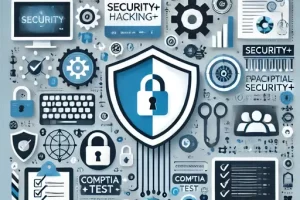
CompTIA A+ Certification – Core Skills and Practical Knowledge
Core Skills and Practical Knowledge for the CompTIA A+ Certification
In today’s rapidly evolving IT industry, foundational knowledge and hands-on experience are more crucial than ever, especially for those entering the field. The CompTIA A+ certification has long been recognized as the standard for entry-level IT professionals, providing a comprehensive overview of the core skills needed to succeed. Candidates increasingly search for terms like “CompTIA A+ troubleshooting skills,” “IT support basics,” and “hardware and software fundamentals,” reflecting the growing demand for practical expertise.
In this article, we’ll delve into why these skills are important, what they entail, and how mastering them prepares you for a successful IT career.
Why Core Skills Matter in IT Support
The IT landscape has undergone massive shifts with the rise of cloud computing, mobile devices, and increased cybersecurity threats. However, the need for strong foundational skills remains unchanged. Every IT support professional needs to be adept at both diagnosing problems and implementing solutions quickly and effectively. This is where the CompTIA A+ certification comes into play.
The CompTIA A+ certification is one of the most respected entry-level IT certifications available. It covers key areas like:
- Troubleshooting hardware and software issues
- Installing and configuring various operating systems
- Basic networking and security practices
- Cloud computing concepts
- Cybersecurity fundamentals
These core skills ensure that IT professionals are not only equipped to handle common technical issues but are also prepared for more advanced roles that require a deeper understanding of complex systems.
Essential Practical Knowledge for CompTIA A+
- CompTIA A+ Troubleshooting SkillsTroubleshooting is perhaps the most vital skill for any IT professional. Whether you’re dealing with hardware failures, software glitches, or network connectivity issues, knowing how to systematically approach and resolve problems is critical. CompTIA A+ focuses heavily on providing candidates with hands-on experience in troubleshooting, ensuring that they are prepared to diagnose and fix common issues in real-world environments.What You’ll Learn:
- Diagnosing hardware issues (e.g., hard drive failure, RAM errors)
- Resolving software conflicts
- Network troubleshooting (e.g., connectivity problems, DNS issues)
- Tools for diagnostics and repair (e.g., Command Line, Windows utilities)
- IT Support BasicsEntry-level IT roles are all about supporting users and maintaining systems. The CompTIA A+ certification includes detailed training on how to provide excellent IT support, focusing on both technical knowledge and soft skills like communication. Knowing how to handle user queries efficiently, offer remote support, and maintain documentation are all core elements of the exam.Key Areas:
- Setting up and configuring hardware like printers, routers, and desktop systems
- Providing end-user support for various operating systems (Windows, Linux, macOS)
- Installing and managing software
- Configuring basic network settings and managing user permissions
- Hardware and Software FundamentalsEvery IT professional must have a strong understanding of both hardware and software fundamentals. This knowledge enables you to diagnose issues and implement solutions across a range of devices and systems. From installing operating systems to configuring peripheral devices, the CompTIA A+ certification ensures you are comfortable working with the most common hardware and software used in IT today.Hardware Concepts:
- Components like CPUs, RAM, motherboards, and power supplies
- Installing and replacing hardware components
- Understanding peripheral devices (printers, scanners, external storage)
- Installing and configuring operating systems (Windows, macOS, Linux)
- Understanding drivers, software updates, and patches
- Resolving software compatibility issues
The Importance of Cybersecurity in IT Support
As the frequency of cyberattacks increases, every IT professional needs a basic understanding of cybersecurity. Even entry-level technicians are often called upon to implement security measures or detect potential vulnerabilities. The CompTIA A+ certification includes foundational cybersecurity topics such as malware identification and removal, secure workstation setup, and encryption. By mastering these skills, you’ll be able to protect the systems you support from common threats.
Learn more about advanced cybersecurity training in our Certified Ethical Hacker (CEH) course at CEHTest.com, where we provide in-depth knowledge on how to detect, prevent, and mitigate cyberattacks.
Preparing for the CompTIA A+ Certification Exam
To excel in the CompTIA A+ exam, it’s essential to take a comprehensive approach to studying. This means not only understanding the exam objectives but also engaging in hands-on practice to solidify your skills. Resources like online courses, practice exams, and lab simulations can significantly boost your chances of success.
One great place to start is with the free mini test offered by Practical Ethical Hacking. It helps you gauge your readiness for IT exams and identify areas that may need improvement.
Conclusion
Mastering the core skills and practical knowledge covered by the CompTIA A+ certification is the first step toward a rewarding career in IT. With a focus on troubleshooting, IT support, and hardware and software fundamentals, the certification prepares you for a range of entry-level roles, providing the hands-on experience employers are looking for. Whether you’re just starting or looking to enhance your skills, gaining a solid foundation through CompTIA A+ will set you on the path to success.
For more advanced certification training, such as the CompTIA Security+ or Network+ exams, check out additional resources at TheComptia.com or CompTIAPlusTest.com for specialized preparation guides and practice tests.
Tag:CompTIA


